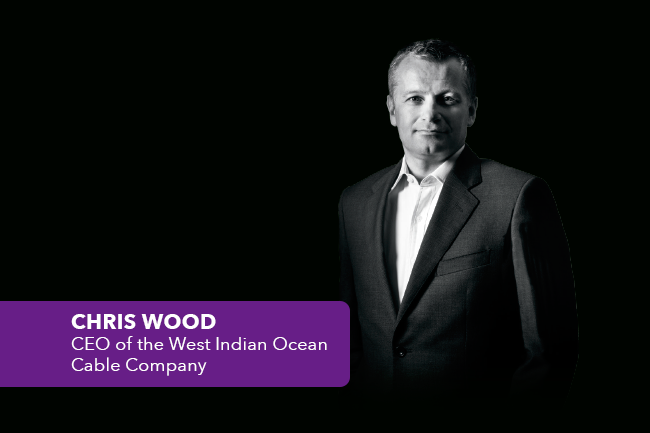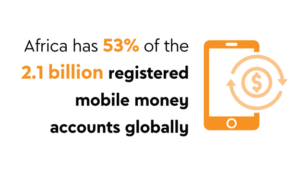For at least half of Africa’s population – rural residents mainly – mobile technology provides access to life-enhancing services such as health, school aids and banking services, which explains why its appetite for connectivity is not only huge but crucial. Despite a concern that infrastructure and affordability are restrictive, findings by the GSM Association, in its 2018 report on sub-Saharan Africa’s mobile economy, show that the subscriber base in the region totalled 444 million in 2017, and that by 2025, it’s expected to reach 634 million.
The increasing availability of high-speed fibre services in largely urban areas and ever-growing mobile phone sales are influential in driving mass demand for internet connectivity, resulting in huge increases in data volumes across the continent. However, it falls to the wholesale market to deliver; those who operate as infrastructure owners, including the West Indian Ocean Cable Company (WIOCC).
Chris Wood, CEO of WIOCC, explains that the wholesale market is very competitive – a good thing for consumers because it tends to drive down prices. However, this is more than offset by the ever-increasing demand for capacity.
‘Eight years ago, a typical client requirement was for 155 megabits per second – now its 100 gigabits per second. Network reach, scale and cost are all critical, enabling the delivery of connectivity to the locations our clients want to reach, but with enough capacity and at the right price.’
To enable this, WIOCC has invested US$300 million into its core network and integrated it with the networks of 14 African telco shareholders. The resulting infrastructure comprises 55 000 km of African terrestrial fibre-optic networks and large amounts of capacity on multiple submarine cable systems.
‘It’s a unique footprint, scaled to meet the ongoing capacity needs of even the most demanding of wholesale clients, and provides WIOCC with a cost base that enables it to compete effectively,’ says Wood.
While clients’ requirements are often complex, WIOCC aims to deliver simplified solutions – essentially end-to-end delivery with a single point of contact, and typically across multiple territories. ‘This means one bill, one contract and one escalation matrix.’ The latter, he says, is important ‘because it eliminates the process of a client having to manage multiple suppliers’.
The process is working – and working well, given that WIOCC is currently carrying a significant proportion of the continent’s internet traffic and supporting the entry of international carriers, internet service providers (ISPs) and over-the-top players into African markets. Their entry means increased competition, lower prices, wider availability of improved connectivity and services, and the adoption of international trends.
One such trend, which has affected the market as a whole, is the migration of content from, principally, Europe to Africa. Content migration is the process of moving data from one location to another, in this case to improve service performance for consumers in Africa.
‘This has driven the demand for more local services like IP Transit, which provides ISPs with their connectivity to the global network,’ according to Wood. ‘In response, we have developed localised versions of some of our services for specific markets.’
This typifies WIOCC’s service offerings as the only pure wholesale player operating in the market for pan-African telecoms infrastructure services. It is reactive to a client’s needs, rather than simply delivering a ‘standard’ product from a portfolio, which it has never done. WIOCC uses its vast collective knowledge to develop bespoke solutions that specifically address needs and challenges, and that have a positive outcome for the client and the company.
It is thus well on its way to fulfilling its vision, which is to be Africa’s leading carriers’ carrier, and to set the standards by which performance is measured in the industry. Wood says that while ongoing investment in its unique network and the services it supports is vital to the future success of the company – as is continuing to identify and commercialise new opportunities for WIOCC to profitably service its clients – fulfilling its mandate really boils down to its employees.
‘Every individual understands the importance of their interaction with clients, be those the network operators, the invoice issuers, event planners or those that greet visitors, track expenditure or liaise with our shareholders.’ He adds: ‘It is the sum of all these interactions – and the strength and duration of the relationships that are thereby created – that will ensure we stay ahead of our competitors and lead the market.
‘Ultimately much of this falls on the sales team, who secure the revenue that funds everything WIOCC is enabled to manifest.’
Over the past 10 years, WIOCC has grown all its key business metrics – revenue, profitability and client base – and expanded into new countries. The company is currently looking to invest in opportunities that will enable it to procure more capacity into the harder-to-reach regions of Africa, according to Wood.
‘We will be responsive to trends in the markets we serve, extending our influence and offerings to the greater benefit of those in need of life-changing technology.’

















